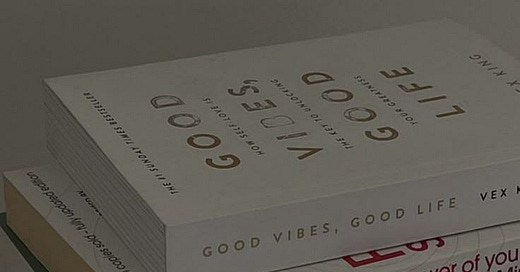I swear I need to write an advice book or something because the ones currently out there are just BS. They’re dry like the Sahara desert, stale like an opened box of saltines used only for the sickliest of times, and cringey like a millennial gauding in their infinity scarf from Target. You get it… I hope. These self-help books are full of great insights and useful tips; however, most of them lack personality and individuality- that raw-realness we all would secretly rather be reading — the gossip, if you will.
I bet that almost all books about growth and self-discovery or improvement say something like,
“You’re probably feeling stuck right now —”This simple start draws the reader in regardless of what state they are currently in. It gives the illusion of deep understanding, while actually casting a wide net, and it works because each word holds a subconscious power.
You’re probably feeling… assumes intimacy — like the author is in your head.
Stuck … vague but emotionally loaded. Almost everyone can relate to at least some
version of this.
Let’s do this little practice with few of the bestselling ‘self-help’ books today,
Atomic Habits by James Clear
“You don’t rise to the level of your goals. You fall to the level of your systems.”
Why it feels specific: It sounds like a cold, hard truth aimed at people frustrated by their own ambition. It implies you've already tried and failed — hitting a nerve most people hide.
But actually: It applies to almost anyone with unrealized goals — which is nearly everyone reading a self-help book.
Outlive by Peter Attia
“You think you’re training for longevity. But really, you’re training for the last decade of your life.”
Why it feels niche: It targets fitness-obsessed readers and flips their perspective. Sounds like advice for biohackers or serious gym-goers.
But actually: Even sedentary readers get pulled in. Who hasn’t worried about aging or being helpless later in life? The phrasing tricks you into thinking, “Wow, he knows what I’ve been missing.”
The Let Them Theory by Mel Robbins
“If they want to walk away, let them. That’s not rejection—it’s protection.”
Why it feels intimate: This sounds like it was ripped straight out of someone’s breakup text thread. Emotional, even spiritual, like something you'd tell a friend over wine.
But actually: It’s an evergreen truth dressed up like revelation. Nearly everyone has someone they feel abandoned by — this line plugs into that wound.
The Common Thread in two words is “PERSONALIZED UNIVERSALITY.”
All these lines, and most of the contents of these books, present a universal frustration (failing habits, fear, or aging, rejection) and cloak it in specific, emotionally charged phrasing designed to make the reader feel seen, without actually knowing anything about your life. They’re designed to bypass logic and hit your identity.
Again, I think these books can be fantastic tools, but that's just what they are, tools. Not everyone will use them in the same way or even know how to use them properly; eventually, they will pile up and sit with dust on the top shelf, to only be grabbed for a need rather than a want. I want to read something entertaining and exciting, like fiction, but with relatability and realism in these self-help books.
So, perhaps this is an invitation for me to write my own…
… only time will tell.




It true...a lot of self help is pure BS...a lot of stating the obvious. When I was your age, a little older, the big book out we all had, all we single ladies that is, was Men and From Mars and Women Are From Venus.....I gripped it like the answer to my prayers. I can't remember if it helped...